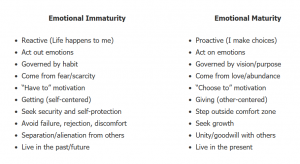5 Ways to Know if You are Emotionally Mature

“Growing up happens when you start having things you look back on and wish you could change.” – Cassandra Clare
You’ve invested a lot of time, energy, and heartache in growing up. For most the path to adulthood is paved with bad choices, mistakes, and rebellion. For some, there was a lot of fun along the way, for others, not so much.
But, whatever your path, here you are all grown up. Did your emotional maturity grow with you or are you still acting like a 10-year-old? Maybe you have been told to “act your age”, or asked, “when will you grow up?” On the contrary, you could be one of those people who have an “old soul” or act mature for your age. How do you know if you are an emotionally mature adult? Read on.
What does ‘emotional maturity’ even mean?
To be emotionally mature means you must have the ability to make positive, healthy choices during the challenging moments in your life. Challenging moments are times when events trigger a strong emotion. You either become defensive, (reactive) or you are proactive. The table explains the differences.

It is difficult to make good choices in times of turmoil, but when we do we become more confident, effective, and relatable.
Your behavior during times of struggle will show the world what level of maturity you mastered. For example, when things are not going the way a young child wants them to go, the child

acts out his fears, hurts and resentments. He does this by screaming, crying, and stomping his feet on the ground in a demanding way. Do you lash out when things aren’t going your way or do you seek to understand?
Emotionally mature people have the following 5 attributes:
- Give and receive love: The emotionally mature person trusts themselves and shows a willingness to accept love from others. They are also willing to show genuine love and affection to others.
- Learn from experience: A mature person accepts responsibility for their actions, good or bad, and learns from their experience rather than find someone to blame. They learn how to problem solve and adjust when needed.
- Deal with frustration: Frustrations come almost every day. Sometimes, more than once in a day. Emotionally mature people face these frustrations with a positive attitude and a willingness to solve the problem. They can accept that not always getting their way is a part of life.
- Accept constructive criticism: Accepting you are not perfect and then accepting correction in a positive manner demonstrates a high level of emotional maturity.
- Be Optimistic and confident: Emotionally mature people see the positive side of life and the good side of people. They are confident in their ability to overcome obstacles and achieve success.
Tips for Ditching Immaturity
Becoming more mature takes work. You must step out of your comfort zone and learn to accept life on life’s terms rather than yours. You must become aware of the world around you and your place in it. You must listen with the intent to understand and learn to practice the art of empathy.
The good news is, with determination and practice, you can grow up and act your age. These 5 steps will get you on your way:
- Be present. Pay attention to your surroundings and your actions within those surroundings. Be aware of how different situations make you feel and practice how you might respond. By being present you give yourself the opportunity to steer the car instead of just riding in the back seat. Take action, make decisions, don’t wait to see what life drops at your feet.
- It is what it is. Reality is the world as it is independently of your thoughts, opinions, and actions. Embrace it. Accept it. By denying, complaining, avoiding, and refusing to accept reality, you give it incredible power over your life. Take what “is” and equip yourself to change it if it can be changed.
- Be responsible. The quality of your life depends on the choices you make. Every day you are faced with choices from what to eat to how you feel about any given situation. Being responsible means you act in ways that will lead you closer to your desired end and in moments of stress you act instead of surrendering control and reacting.
- Decide what you want. You must be clear and focused on what you want out of your life. Knowing what is important to you and to your future gives you the motivation to make good choices when an event is triggered and you must respond. Having direction makes it easier to not be governed by impulses and circumstances.
- Be honest and honorable: It is easier to lie than be honest. When you have wronged someone and do not want to be held accountable for your actions, you simply lie. This is a huge, neon sign of immaturity. You cannot grow and mature if your answer to every difficult situation is to lie. Being honorable means that you live your life in a way that represents integrity, honesty, and discipline. You don’t choose the path that is easier, nor do you self-indulge or seek revenge. You come from a place in which you do what is right because it is the right thing to do whether it benefits you or not.
 Emotional maturity means you have experience in how the world works and knowledge of basic problem-solving techniques. A mature person does not throw things across a room when they don’t get their way or hit someone that doesn’t agree with them.
Emotional maturity means you have experience in how the world works and knowledge of basic problem-solving techniques. A mature person does not throw things across a room when they don’t get their way or hit someone that doesn’t agree with them.
When you have control over your emotions and understand that your actions have consequences and then manage yourself accordingly, only then are you emotionally mature.



Hello,
nice to see one of my photos over here!
Just in case you would like follow me:
http://www.christianfregnan.com
https://www.facebook.com/christianfregnan/
https://www.instagram.com/christianfregnan/
thanks!
That’s Awesome Christian!! Tell me which one is yours and I’ll figure out how to go back in and put your name on it. I download so many photo’s I forget what name goes to which one.